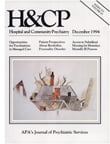Characteristics of Private-Sector Managed Care for Mental Health and Substance Abuse Treatment
Abstract
Objective: This study examined diversity during the late 1980s in managed care programs for mental health, alcohol abuse, and drug abuse to identify ways in which research can generate more meaningful data on the effectiveness of utilization review programs. Methods: Telephone interviews were conducted with representatives of utilization review programs for employee health insurance plans in 31 firms that employed 2.1 million people in 1990. Questions addressed qualifications of personnel, clinical criteria to authorize care, integration with employee assistance plans, penalties for not complying with utiization review procedures, outpatient review, and carve out of mental health and substance abuse review. Results: Large variations in utilization review programs were found. Programs employed a range of review personnel and used a variety of clinical criteria to authorize care. More than two-thirds did not carve out mental health and substance abuse review from medical-surgical review. Some firms' employee assistance plans were integrated with utilization review programs, while others remained unintegrated. Penalties for not following program procedures varied widely, as did review of outpatient services. Conclusions: Because of trends toward even more diversity in utilization review programs in the 1990s, research that identifies the specific features of managed care programs that hold most promise for controlling costs while maintaining quality of care will increasingly be needed.
Access content
To read the fulltext, please use one of the options below to sign in or purchase access.- Personal login
- Institutional Login
- Sign in via OpenAthens
- Register for access
-
Please login/register if you wish to pair your device and check access availability.
Not a subscriber?
PsychiatryOnline subscription options offer access to the DSM-5 library, books, journals, CME, and patient resources. This all-in-one virtual library provides psychiatrists and mental health professionals with key resources for diagnosis, treatment, research, and professional development.
Need more help? PsychiatryOnline Customer Service may be reached by emailing [email protected] or by calling 800-368-5777 (in the U.S.) or 703-907-7322 (outside the U.S.).



